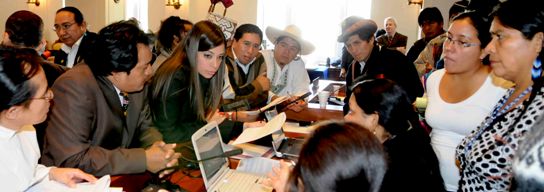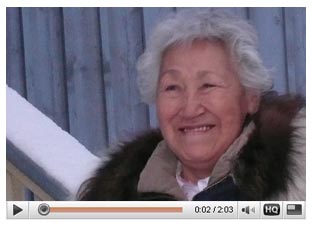 Hello and Happy New Year! Hello and Happy New Year! This is the first chance I have had in 2010 to tell you about the exciting work ahead for the Indian Law Resource Center. Looking forward, the Center's key initiatives will seek to change the legal framework that is causing Indian and Alaska Natives to endure poverty and marginalization throughout the United States. This framework denies their basic human rights: to equal treatment; to control and manage their lands; to fair and unreasonable law enforcement; and to prosecution of violent crimes committed against them. In the next few months we will be working to overturn one of the most discriminatory and unconstitutional legal doctrines affecting Indian and Alaska Native tribes. Remember the name Timbisha Shoshone, they are a small tribe in Death Valley, California. We are working with tribal leaders there to challenge the federal government's ability to take Native property without compensation or due process of law. We believe this case is precedent setting in nature. Please check in with us throughout the year for progress on this important work, http://www.indianlaw.org/. We will also move forward with our efforts to create a fair framework of law for Native peoples and their lands with our Native Land Law Project. Through our Safe Women/Strong Nation project, we will continue to provide legal assistance and educational materials to increase tribes' capacity to effectively police their lands, respond to victims, and prosecute violent offenders. Finally, we will continue our efforts to implement the United Nations Declaration on the Rights of Indigenous Peoples and to encourage the Obama Administration to endorse it. Without the recognition of these rights and changes to unjust federal laws and policies, the struggles Indian and Alaska Native nations deal with on a daily basis will never be fully resolved. We look forward to another year of working closely with Indian and Alaska Native nations so that they can gain effective control of their homelands and improve their economic and social well-being. Megwetch, Robert T. Coulter | ||
| Fighting to Protect Alaska's Rivers | ||
Elder Annie Lou Williams lives in a small Native village in the Kuskokwim region of Alaska known as Upper Kalskag. Her ways are simple and traditional. "The river is alive and it helps me to survive. I drink the water, and everything that is connected to the land is connected to the water," said Williams. The Kuskokwim River originates in Denali National Park, on the north side of Mt. McKinley, and flows 825 miles into the Bering Sea. It is the longest free-flowing river in the United States. The drainage area is roughly the size of the state of Washington. (More...) | ||
| Update on the American Declaration on the Rights of Indigenous Peoples | ||
This is the 12th meeting to try and negotiate an American Declaration on the Rights of Indigenous Peoples that can be supported by OAS member countries and indigenous peoples. The Declaration would affirm the right of self determination, rights to education, health, self government, cultural heritage, and the right to lands, territories and natural resources. (More...)  | ||
| A sorry saga | ||
| ||
| With matching gifts you can sometimes double or even triple your gift! | ||
Over 13,000 companies nationwide offer an employee matching gift program. The best news is that it's free and only takes a few minutes! Most companies simply ask that you complete a short form. :: Contact your Human Resources Department to see if they offer a matching gift program. The impact of your gift may be doubled or possibly tripled! Some companies also match gifts made by retirees and spouses. Mail your completed matching gift form to: Click here to donate now through our secure online service.  | ||
| Now Hiring: Attorney needed in the Center's DC office | ||
The Indian Law Resource Center is considering applications for an attorney position in the Washington, D.C. office. The attorney will provide legal assistance to Indian and Alaska Native nations, including Indian peoples in Mexico and Central and South America, in matters relating to indigenous rights, sovereignty and international human rights, environmental protection and the rights of Native women. (More...) | ||


